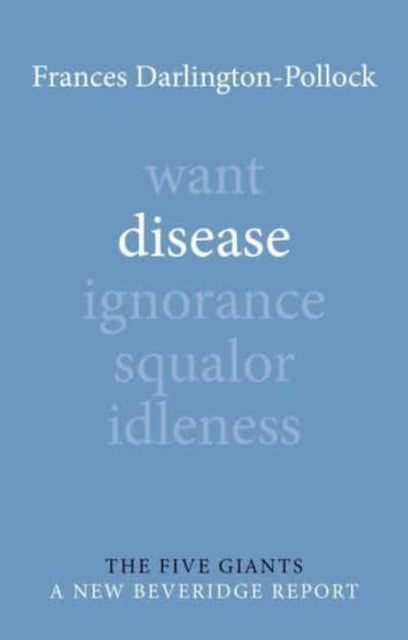Dr FrancesDarlington-Pollock
Disease
Disease
YOU SAVE £0.96
- Condition: Brand new
- UK Delivery times: Usually arrives within 2 - 3 working days
- UK Shipping: Fee starts at £2.39. Subject to product weight & dimension
Bulk ordering. Want 15 or more copies? Get a personalised quote and bigger discounts. Learn more about bulk orders.
Couldn't load pickup availability
- More about Disease
Life expectancy at birth was 66 for women and 60 for men in 1942, but since 2011 incremental improvements have stalled and even reversed. Infant mortality rates have crept up, and the postcode lottery of health provision underscores the level of social inequality in the UK. Good health is not just the absence of disease, but the collective of physical, social and mental well-being. Access to many of the things that make and keep us healthy are not evenly distributed, and achieving good health is deeply entwined with all aspects of society. It is essential to address the underlying causes of disease, which are not only social or physiological, but also political.
Format: Paperback / softback
Length: 224 pages
Publication date: 20 October 2022
Publisher: Agenda Publishing
In 1942, life expectancy at birth was a mere 66 years for women and 60 years for men, a stark reflection of the prevailing health conditions of the time. The leading causes of death were degenerative and infectious diseases, plunging many lives into premature endings. However, the aftermath of World War II brought about a significant turning point in the fight against disease. The establishment of the National Health Service (NHS) in the United Kingdom marked the greatest postwar success in the realm of healthcare. This landmark system provided free care at the point of delivery, ensuring that medical services were accessible to all, regardless of their socio-economic status.
The impact of the NHS was profound. Life expectancy soared, and the prevalence of chronic diseases declined. The nation witnessed a remarkable improvement in public health, leading to a healthier and more vibrant population. However, as time passed, incremental improvements in life expectancy began to stall, and in some regions, even reversed. Infant mortality rates crept up, highlighting the ongoing challenges in ensuring the well-being of young children. The postcode lottery of health provision further underscored the level of social inequality that persisted in the UK.
While good health is undeniably the absence of disease, it encompasses a much broader spectrum of physical, social, and mental well-being. It is the culmination of factors such as nutrition, genetics, healthy lifestyles, and preventative health interventions. It is the interplay between the conditions in which we live, work, play, and age that shapes our overall health and well-being. Unfortunately, access to many of the elements that contribute to good health is not evenly distributed within the population. Achieving good health is a complex and multifaceted endeavor that requires a holistic approach, involving policies and interventions across various sectors.
In the context of our rediscovery of Beveridge, the shadow of the pandemic looms large. It serves as a stark reminder of the underlying causes of disease and the urgent need to address them. It is evident that these determinants are not solely social or physiological, but also political. The pandemic has exposed the fragility of our healthcare systems, the inequalities in access to healthcare, and the disproportionate impact of diseases on marginalized communities. It has highlighted the urgent need for systemic change, for policies that promote equity, social justice, and the well-being of all individuals.
To achieve good health, we must recognize the interconnectedness of all aspects of society. It is not enough to focus solely on individual behaviors or medical interventions. We must address the root population-level factors that contribute to disease, such as poverty, inequality, social exclusion, and environmental degradation. We must invest in public health infrastructure, promote healthy lifestyles, and ensure that everyone has access to quality healthcare services. We must also address the political determinants of health, such as the influence of corporate interests, lobbyism, and the lack of political will to prioritize public health.
In conclusion, good health is a fundamental human right that should be accessible to all. It is not just the absence of disease but a collective of physical, social, and mental well-being. Achieving good health requires a holistic approach that involves policies and interventions across various sectors. The pandemic has highlighted the urgent need to address the underlying causes of disease, the inequalities in access to healthcare, and the political determinants of health. It is time for us to redouble our efforts, to work together towards a healthier and more equitable society.
Weight: 182g
Dimension: 129 x 197 x 15 (mm)
ISBN-13: 9781788213912
This item can be found in:
UK and International shipping information
UK and International shipping information
UK Delivery and returns information:
- Delivery within 2 - 3 days when ordering in the UK.
- Shipping fee for UK customers from £2.39. Fully tracked shipping service available.
- Returns policy: Return within 30 days of receipt for full refund.
International deliveries:
Shulph Ink now ships to Australia, Belgium, Canada, France, Germany, Ireland, Italy, India, Luxembourg Saudi Arabia, Singapore, Spain, Netherlands, New Zealand, United Arab Emirates, United States of America.
- Delivery times: within 5 - 10 days for international orders.
- Shipping fee: charges vary for overseas orders. Only tracked services are available for most international orders. Some countries have untracked shipping options.
- Customs charges: If ordering to addresses outside the United Kingdom, you may or may not incur additional customs and duties fees during local delivery.


